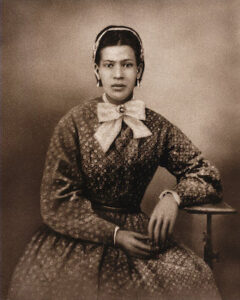
Marie Laveau
*Marie Laveau was born on this date in 1801. She was a Black Voodoo practitioner, herbalist, and midwife.
Marie Catherine Laveau was born a Creole-free woman of color in New Orleans, Louisiana. Spanish colonial officials still administered Louisiana at the time of her birth. Her mother, Marguerite D'Arcantel, was a free woman of color of African, European, and Native American ancestry. Because her mother was not married at the time of her birth, her father was not on her baptismal record. A possible candidate is Charles Laveau, the son of Charles Laveau Trudeau, a white Louisiana Creole and politician.
In 1819, she married Jacques Paris, a Quadroon free man of color, at the St. Louis Cathedral in New Orleans. Jacques was part of a large White and Creoles of Color who worked as a carpenter. Jacques Paris died in 1820. Following the death of her husband, she entered a domestic partnership with Christophe Dominick Duminy de Glapion, a nobleman of French descent, until he died in 1855. They had 15 children. The only two children to survive into adulthood were daughters: the elder named Marie Eucharist Eloise Laveau and the younger named Marie Philomène Glapion. During her practice, Laveau attended to prisoners who were sentenced to death.
A reporter from the New Orleans Republican detailed one such visit in an article published on May 14, 1871, in which he describes Marie Laveau as a "devout and acceptable member of the Catholic communion." Following her death, her daughter Philomène confirmed during an interview with a reporter from the Picayune that only Catholic traditions would take place during these visits and that her mother would also prepare the men's last meal and pray with them. Marie Laveau also sought pardons or commutations of sentences for those she favored and was often successful in her efforts.
She was known to care for the sick in her community during the yellow fever epidemic of 1878 by providing herbal remedies and prayers. Her other community activities included providing lessons to the women of the community and doing rituals for those in need without charge. Laveau also started a beauty parlor for the wealthier families of New Orleans. She excelled at obtaining inside information on her wealthy patrons at the beauty parlor by listening to ladies gossiping or from their servants whom she either paid or cured of mysterious ailments. She used this information during her Voodoo consultations with wealthy Orleanian women to enhance her image as a clairvoyant; and used this intel to give them practical advice.
She also made money by selling her clients gris as charms to help their wishes come true. Customers often appealed to Laveau for help with family disputes, health, finances, etc. Laveau performed her services in three places: her home on St. Ann Street, within Go Square, and at Lake Pontchartrain. She was the third female leader of Voodoo in New Orleans. Of her magical calling, there are minor that can be substantiated, including whether she had a snake she named after an African god and whether the occult part of her magic mixed Roman Catholic saints with African spirits and Native American Spiritualism.
Marie Catherine Laveau died on June 15, 1881, aged 79. The Daily Picayune that Marie Laveau had passed peacefully in her home. News of her death was in several Virginia, Nebraska, and Minnesota newspapers. At least two of her daughters were named Marie; one assumed her position with her name and carried on her magical practice, taking over as the queen soon before or after the first Marie's death. Due to her strong influence, New Orleans Voodoo lost many adherents after her death. Her daughter, Marie Laveau II, displayed more theatrical rubrics by holding public events (including inviting attendees to St. John's Eve rituals on Bayou St. John). Marie Laveau is confirmed to have owned at least seven enslaved people during her lifetime.